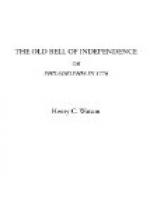“The retreat just when victory was within his grasp was enough to irritate any commander who valued his aim and plan,” observed Mr. Jackson Harmar, agreeing with Smith in the remarks which he had just made. “I suppose, if Washington had been completely successful at Germantown, the British would have been driven from Philadelphia,” said Higgins.
“Ay; and from the vicinity of Philadelphia,” replied Smith. “They could not have recovered from such a defeat.”
[Illustration: BATTLE OF THE KEGS.]
BATTLE OF THE KEGS.
“Father,” said Mr. Jackson Harmar, “I have a song in my portfolio, written by Francis Hopkinson while the British were in Philadelphia; perhaps you can tell us something about the event which is the subject of it. Here it is. It is called ‘The Battle of the Kegs.’”
“The Battle of the Kegs! That I can, my boy. But read the song,” replied old Harmar. His son then read the following facetious ditty:
“Gallants, attend, and hear a friend
Trill forth harmonious ditty:
Strange things I’ll tell, which
late befell
In Philadelphia city.
Twas early day, as poets say,
Just when the sun was rising,
A soldier stood on log of wood,
And saw a sight surprising.
As, in amaze, he stood to gaze,—
The truth can’t be denied, sirs,—
He spied a score—of kegs, or
more,
Come floating down the tide, sirs.
A sailor, too, in jerkin blue,
The strange appearance viewing,
First damn’d his eyes, in great
surprise,
Then said, ’Some mischief’s
brewing.
These kegs now hold the rebels bold,
Pack’d up like pickled herrings
And they’re come down to attack
the town,
In this new way of ferrying.’
The soldier flew, the sailor, too,
And, scared almost to death, sirs,
Wore out their shoes to spread the news,
And ran till out of breath, sirs.
Now up and down, throughout the town,
Most frantic scenes were acted;
And some ran here, and some ran there,
Like men almost distracted.
Some fire cried, which some denied,
But said the earth had quaked;
And girls and boys, with hideous noise,
Ran through the town half-naked.
Sir William he, snug as a flea,
Lay all this time a snoring,
Nor dream’d of harm, as he lay warm,
While all without was roaring.
Now, in affright, he starts upright,
Awaked by such a clatter:
He rubs both eyes, and boldly cries,
‘For God’s sake, what’s
the matter?’
At his bedside he then espied
Sir Erskine at command, sirs;
Upon one foot he had one boot,
And t’other in his hand, sirs.
‘Arise! arise!’ Sir Erskine
cries:
’The rebels—more’s
the pity—
Without a boat, are all afloat,
And ranged before the city.




